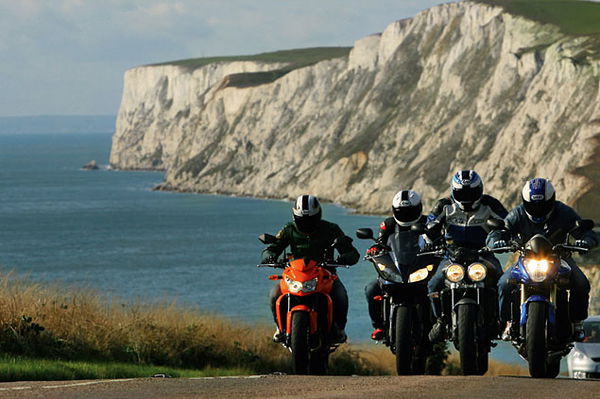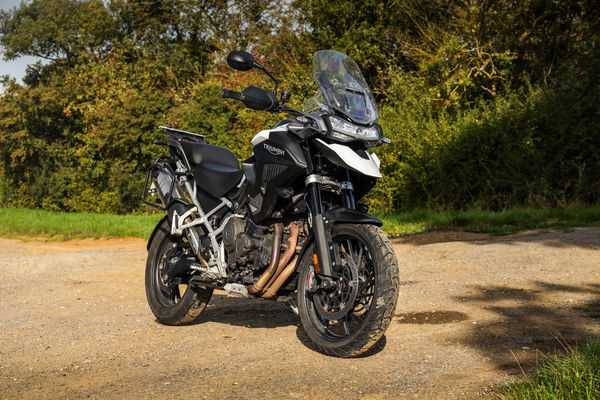Should I Just Buy a Blade? CBR1000RR Fireblade V RSV4 Factory
Flash, fast and fearsomely expensive, the world would be a colder place without exotica like Aprilia’s £15,000 RSV4 Factory. But when Honda’s CBR1000RR is faster, far less expensive, aren’t you better off with a Blade?
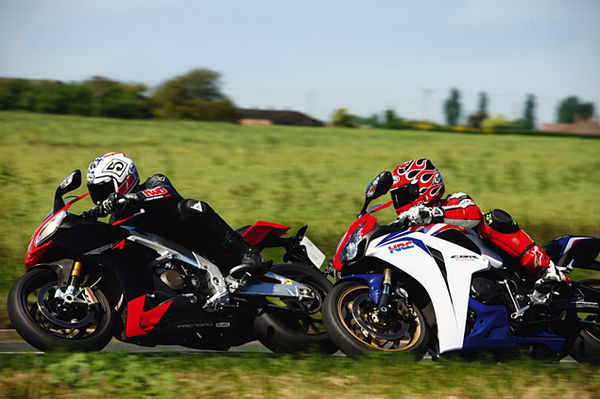

�
This is not a test. Aprilia’s RSV4 Factory costs a full £5,000 more than a 2009 Honda Fireblade, or half as much again. On paper it’s also clearly inferior, making less power and torque and hitting a top speed nearly 10mph down on the CBR1000RR’s V-max of 181.5mph.
It’s also very difficult to believe Honda will be able to make the Fireblade any better than it is right now; that this isn’t the apogee of the evolution of the road-going superbike. They will of course, but the utter ease and civility with which the Fireblade takes apart your previous sportsbike points of reference is breathtaking.
Perversely, the bike’s defining quality is its ability to take all worry out of proceedings, leaving you to play with its huge power, amazing brakes and vice-free handling. For years Honda’s mastery of ergonomic refinement helped bring the rider closer to this state of blissful, fear-free union by removing anything that might demand brain-space; a heavy clutch for instance, or an oddly-shaped seat.
The 2003 CBR600RR brought us closer still, stripping away another layer of white noise with the introduction of mass-centralised chassis packaging – ultra-fast steering without the previously inevitable instability had arrived. The current Fireblade is simply the ultimate evolution of all that work, with an electronic damper to banish slappers and optional C-ABS, a system so clever a lame donkey can bring a Blade to a standstill from 150mph in the length of a table tennis table. Hell, it’s even pretty. Suzuka 8 Hour red, white and blue on gold rims? Pronk!
Click next to continue
£15,000 V £9,800
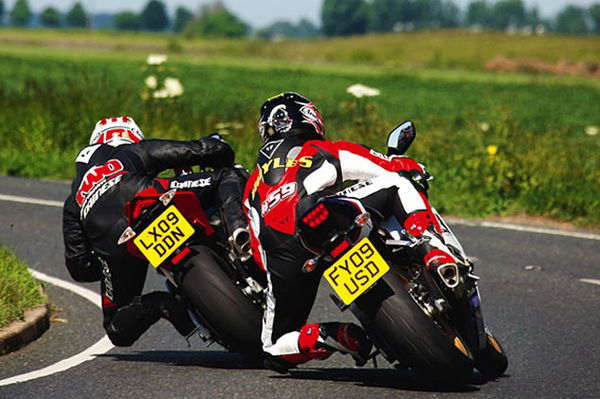
�
Riding too fast cross-country on brand new, unscrubbed Dunlops, there’s no other bike I’d rather be on. Racing to meet Rob and the Aprilia on time, a hot, hot heat is helping allay my freshtyre fears but in truth the Fireblade feels so untroubled it may as well snow – the bike just isn’t bothered. The awesome brakes lend massive confidence, as does a chassis that takes your slightly messy corner entry and kindly blends it into an accurate line for you, all the time exuding an air of cuddly, benign ease.
The thing’s comfortable for a sportsbike too, with a short-reach riding position that can do the miles, a plush edge to the ride quality, decent mirrors, a screen that’s almost useful and an engine that makes up in fear-free power what it lacks in fancy switchable engine maps. Good luck getting any luggage on that vestigial tail, though.
Before we get into the Aprilia, a confession; the RSV4 Factory does it for me in a massive way. A couple of months ago, James Whitham and Niall Mackenzie were kept from the new Aprilia’s world launch at Misano by hectic diaries. I got the gig. The notoriously slippery circuit may have been rain-lashed but the Aprilia’s class shone through: unbelievable agility; easy, usable power; and the kind of charisma that has your brain thinking £15,000 is actually very reasonable for a plaything. I was smitten.
Now, on dry, sun-baked UK roads, the Aprilia remains bewitching. Having turned up on the Fireblade, I was all set to write off the Italian bike (not literally) – “What more could you possibly want?” and all that. Then I rode it. By contrast the Honda felt soft, a little remote and just a little ordinary. Tiny, as mass-centralised as the Honda and focussed like few road bikes before it, if you’ve got half a clue about what you’re doing, the big-money Italian superbike is the easier of the two machines to go fast on.
Click next to continue
The verdict
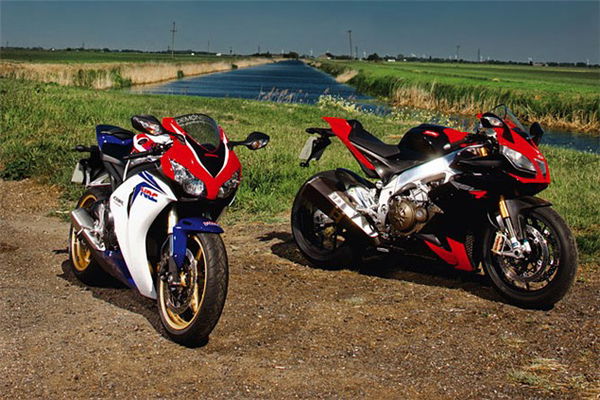
�
The RSV4 Factory is too small and far too firm, both of suspension and of seat, to be road-practical in any rational sense but, when you actually get to the bits of road we ride for – those dry, well-sighted corner-complexes miles from anywhere – the Aprilia experience is pixelperfect High Definition next to the Blade’s slightly fuzzy cathode-ray alternative.
The Italian bike is completely locked down, with no lost movement from either its suspension or its Pirelli Supercorsa tyres. It reacts to your every input with a shocking immediacy and accuracy, babbling away with priceless feedback that encourages you to attack every corner like Ben Spies’ R1 is on your tail. If you’re confident you’ll cherish this unedited dialogue. If you’re not, chances are you’ll prefer the Fireblade’s more soothing pillow talk. In the rain few wouldn’t.
The RSV4’s brakes are similarly direct. There’s no initial comfort travel, no fuzz, just the kind of stopping power that crumples tarmac. And then of course there’s the engine: powerful, usable and as beautiful to listen to as it is to use. The little things are right, too. The on/off fuelling’s good and the few degrees of dead travel in the throttle perfectly judged. The gearbox is good too, with a shift action that’s been improved since the launch bikes.
If you spend days at a time in the saddle, perhaps crossing the Channel to playground Europe every couple of weeks to junk a pair of tyres, go Fireblade – the Aprilia will batter your backside into surrendering long before you reach Dover. But if you live for those snatched moments of dynamic bliss that elevate riding a motorcycle to something spiritual, with angels singing and stuff, if you worship race bikes as some people do God and you hear race V4s in your dreams (Doohan’s Suzuka 8 Hour RVF perhaps, or Andrea Dovizioso’s RCV on the overrun) the RSV4 Factory is every bit as awesome as you dared dream it would be. That it’s also beautifully built, with detailing you could lose months taking in, is just the cherry on a cake the size of Rome’s Coliseum.
Second Opinion
Former-assistant editor Rob Hoyles on two very different ways to skin a superbike cat
It never ceases to amaze me just how different two bikes built for the same purpose can be. In this case one’s a brilliant race bike with a few concessions made for the road; the other’s a corking road bike with race potential built-in and waiting to be unleashed.
Visually the Aprilia is stunning from every angle. Sure, in its pretty HRC colours the CBR is no minger either, but as an object of desire there’s no competition – the RSV4 wins.
I expected the Aprilia’s low-down fuelling to be lumpy and a little confused at small throttle openings, and I was right. Just like the RSV Mille, the RSV4 isn’t about going slowly. It begs to be given its head, to flow through well-surfaced apexes, its quality suspension alive with feedback, albeit to the detriment of anything resembling rider comfort. If your roads aren’t billiard-table smooth then prepare for pain.
By contrast the Fireblade can put up with just about anything. Yes it can feel a little soft and bland after a blast on the RSV4, but this apparent lack of charm and charisma is simply Japanese efficiency and accuracy being metered out by the best 1000cc machine on the market.
To my mind, it’s all about the joy of ownership versus the questionable sense of investing in a motorcycle in the first place. My head says: “Buy the Japanese machine that costs less, will give little or no trouble and do everything I’ll ever want it to”. And of course I know my head’s absolutely right. But my heart pounds with excitement for the Aprilia RSV4 Factory in a way it simply never will for anything from the land of the rising sun. CBR1000RR Fireblade included.
Specifications
Aprilia
Price: £14,999
Top speed: 172.4mph
Engine: 999.6cc, 16-valve, 65° V4
Bore x stroke: 78mm x 52.3mm
Compression ratio 12.8:1
Power: 160.04bhp @ 12,800rpm
Torque: 76.25lb.ft @ 10,000rpm
Front suspension: Upside-down telescopic forks
Adjustment: Preload, compression and rebound
Rear suspension: Monoshock
Adjustment: Preload, compression and rebound
Front brakes: 2 x 320mm discs, four-piston calipers
Rear brake: 220mm disc, two-piston caliper
Dry weight: 179kg
Seat height: 845mm
Fuel capacity: 17 litres
Colours: Red/Black
HONDA
Price: £9800
Top speed: 181.5mph
Engine: 999cc, 16-valve inline four
Bore x stroke: 76mm x 55.1mm
Compression ratio: 12.3:1
Power: 167.12bhp at 12,000rpn
Torque: 80.42lb.ft at 8750rpm
Front suspension: Upside-down telescopic forks
Adjustment: Preload, compression and rebound
Rear suspension: Monoshock
Adjustment: Preload, compression and rebound
Front brake: 2 x 320mm discs, four-piston calipers
Rear brake: 220mm disc, single-piston caliper
Wet weight: 199kg
Seat height: 820mm
Fuel capacity: 17.7 litres
Colours: HRC, Repsol, Black/Silver
